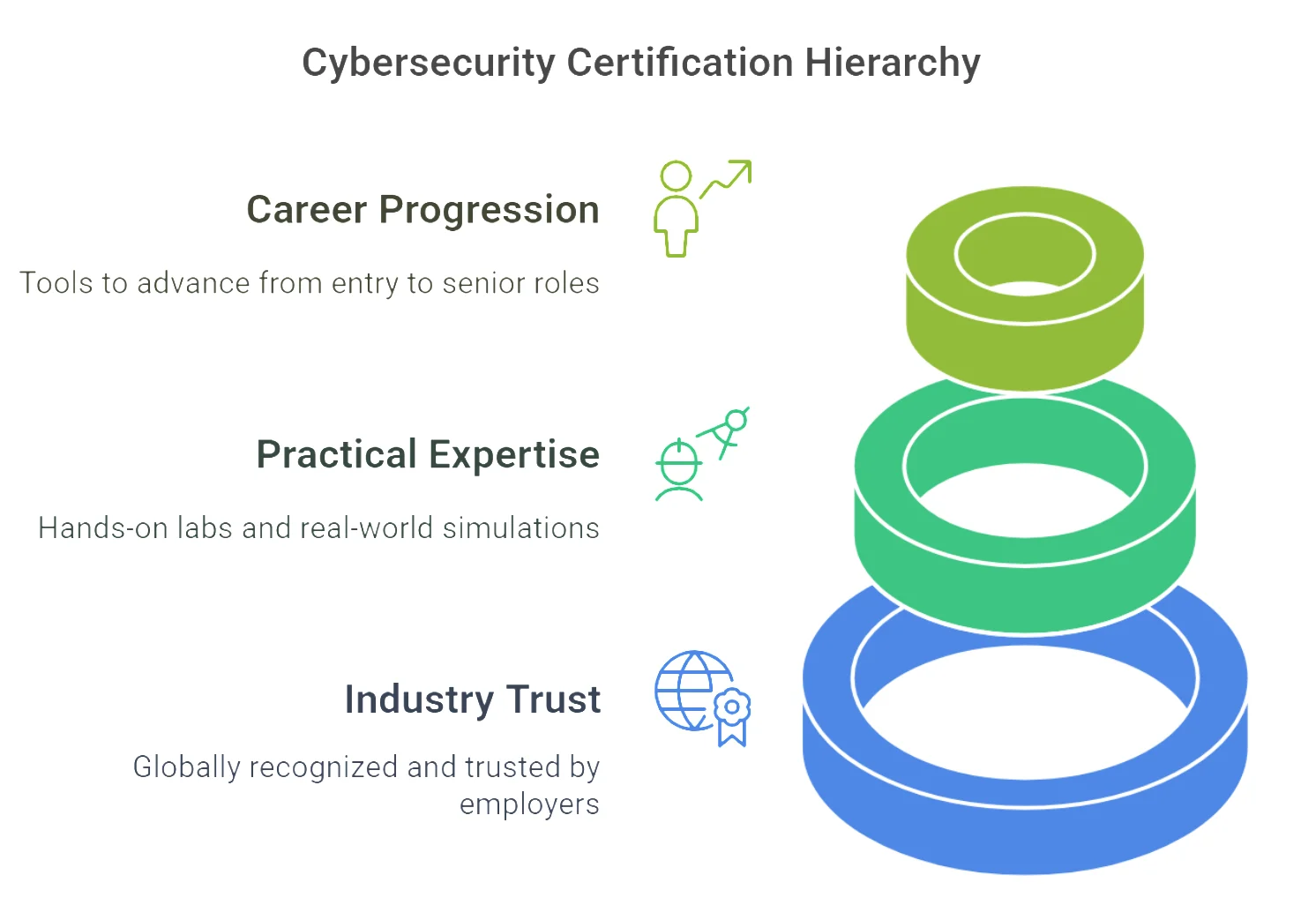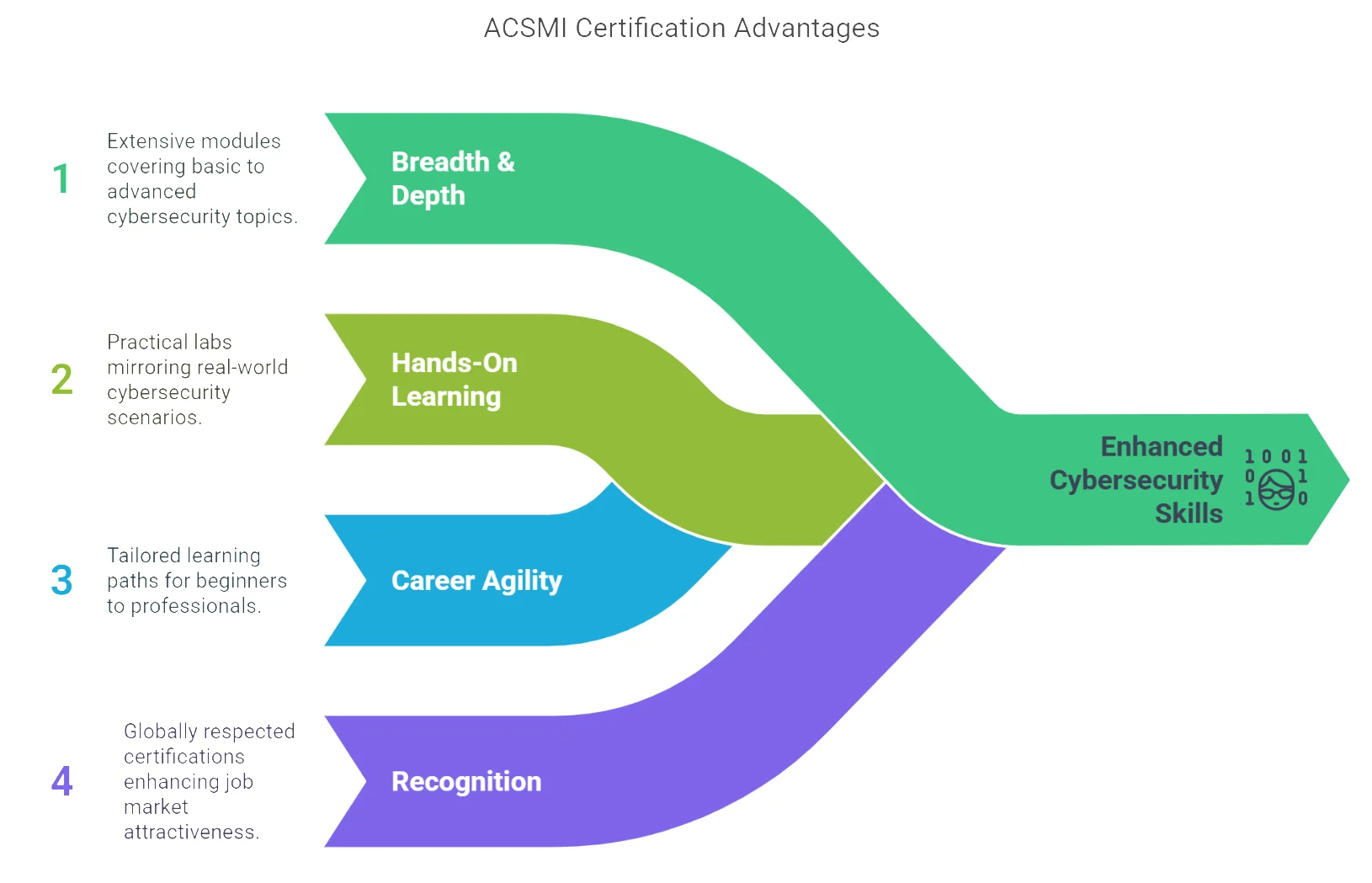Table of Contents
- Why Do Certifications Matter?
- Popular Cybersecurity Certifications
- Which Cybersecurity Certification Should I Get Based on My Career Goals?
- Benefits of Choosing ACSMI’s Certification
- (FAQs) Frequently Asked Questions
- Certification Comparison
- A Real-World Story – How the Right Certification Changed a Career
- Final Thoughts
In 2025, cybersecurity is one of the fastest-growing and most sought-after fields. With the constant rise in Cyber Threats and cyberattacks targeting both private companies and government institutions, the demand for certified professionals in the field is skyrocketing. As a result, many individuals are looking for the best way to break into or advance their cybersecurity careers. If you’re one of them, you’re likely asking, “Which cybersecurity certification should I get?” The right certification can significantly impact your career, positioning you for better job opportunities, higher salaries, and increased job security.
Choosing the right cybersecurity certification depends on several factors such as your career goals, the skills you want to acquire, your level of experience, and the type of role you aspire to pursue. Below, we break down the key considerations and provide recommendations for certifications that can help you achieve your career aspirations.
Why Do Certifications Matter?
Certifications are much more than just letters on a resume—they serve as an important validation of your skills and expertise in specific cybersecurity domains. In an industry where the threat landscape is constantly changing, certifications ensure that you stay updated and prepared to handle new types of cyber threats. They serve as proof to employers that you have the training and expertise to safeguard their digital infrastructure.

Key Takeaways on Certifications:
- Industry Trust: Leading certifications like CISSP, CompTIA Security+, and CISM are globally recognized and trusted by employers.
- Practical Expertise: Many certifications focus on practical learning through hands-on labs and real-world simulations, giving you the experience needed to apply your skills in the field.
- Career Progression: Certifications like ACSMI’s 400+ module program cater to a wide range of experience levels, from entry-level positions to senior roles, providing you with the tools you need to progress in your cybersecurity career.
Now, let’s explore the types of certifications available and help you decide which one is right for your career.
Popular Cybersecurity Certifications
When you’re starting your journey into cybersecurity or planning to specialize in a specific area, choosing the right certification is critical. Here are some popular cybersecurity certifications that cater to different career levels and areas of expertise:
1. CompTIA Security+
CompTIA Security+ is one of the most recognized entry-level certifications for anyone looking to get into cybersecurity. It provides foundational knowledge in topics like network security, cryptography, risk management, and incident response.
- Ideal for: Beginners who want foundational knowledge in cybersecurity.
- Focus Areas: Network security, threat management, cryptography, and compliance.
- Cost: Around $392.
Why Choose It?
CompTIA Security+ is perfect for individuals who are new to cybersecurity. It’s widely recognized in the industry and serves as an excellent introduction to more advanced certifications.
2. Certified Information Systems Security Professional (CISSP)
CISSP is one of the gold-standard certifications for experienced cybersecurity professionals. This certification is globally recognized and is ideal for those pursuing mid-to-senior level roles.
- Ideal for: Professionals with 5+ years of experience in cybersecurity.
- Focus Areas: Risk management, software development security, and compliance.
- Cost: Around $749 for the exam (excluding training costs).
Why Choose It?
CISSP is one of the most prestigious certifications in the cybersecurity industry. It’s a great fit for individuals aiming for roles like Security Architect, CISO, and other leadership positions. It offers a broad understanding of security across various domains.
3. Certified Ethical Hacker (CEH)
If ethical hacking or penetration testing is of interest to you, the Certified Ethical Hacker (CEH) certification will provide you with the tools to perform penetration testing, simulate attacks, and identify vulnerabilities in systems.
- Ideal for: Aspiring ethical hackers or penetration testers.
- Focus Areas: Hacking methodologies, penetration testing, attack vectors, and mitigation strategies.
- Cost: Around $1,199.
Why Choose It?
CEH offers hands-on training in ethical hacking techniques, helping you to think like a hacker and improve your ability to defend against cyberattacks. It is one of the top certifications for penetration testers and those interested in ethical hacking.
4. Certified Information Security Manager (CISM)
CISM is ideal for individuals transitioning into managerial roles in cybersecurity. It emphasizes the importance of risk management, governance, and security program development—making it a perfect choice for IT managers looking to advance into cybersecurity leadership.
- Ideal for: IT managers and those aiming for cybersecurity management roles.
- Focus Areas: Governance, risk management, and program development.
- Cost: Around $760.
Why Choose It?
CISM is great for professionals transitioning from IT management to cybersecurity. It provides the leadership and managerial skills needed to drive security initiatives and policies within organizations.
5. ACSMI 400+ Specialist Modules Certification
ACSMI’s certification program offers over 400 modules covering a comprehensive range of cybersecurity topics, from beginner to advanced levels. This certification provides the flexibility to tailor your learning to specific domains such as penetration testing, threat intelligence, and cloud security.
- Ideal for: All levels—from beginners to seasoned cybersecurity professionals.
- Focus Areas: Threat intelligence, advanced hacking, cloud security, and incident recovery.
- Cost: Varies depending on the selected modules.
Why Choose It?
ACSMI offers comprehensive, hands-on training that covers all aspects of cybersecurity. With its modular learning structure, ACSMI enables you to learn at your own pace and choose the modules most relevant to your career goals. Its focus on real-world simulations and industry-relevant scenarios sets it apart from other certifications.
Which Cybersecurity Certification Should I Get Based on My Career Goals?
Choosing the right certification depends on your career goals, level of experience, and preferred career path. Security Technology Key Trends can also influence which certifications are most valuable in the current job market. Here are some tailored recommendations based on different career trajectories:
1. For Beginners
If you’re new to the field of cybersecurity, it’s essential to start with certifications that offer a solid foundation in key concepts like network security, risk management, and incident response. CompTIA Security+ is an excellent starting point, as it covers the fundamentals and prepares you for more advanced topics.
- Recommended Certifications: CompTIA Security+, ACSMI’s beginner modules.
2. For Technical Specialists
If you’re looking to specialize in ethical hacking, penetration testing, or security analysis, CEH and Offensive Security Certified Professional (OSCP) are great options. These certifications focus on hands-on hacking labs and provide practical experience in ethical hacking techniques.
- Recommended Certifications: CEH, OSCP, ACSMI’s security testing modules.
3. For Managers or Leaders
If you’re transitioning from an IT management role or aiming for a leadership position within cybersecurity, certifications like CISM or CISSP are ideal. These certifications focus on governance, risk management, and security architecture—skills needed to manage cybersecurity teams and programs.
- Recommended Certifications: CISM, CISSP, ACSMI’s governance and risk management modules.
4. For All-Round Experts
If you want to excel in multiple areas of cybersecurity, combining certifications like CISSP with ACSMI’s comprehensive 400+ module certification will give you a well-rounded skill set. This combination allows you to gain both depth and breadth in cybersecurity, preparing you for roles across various sectors.
- Recommended Certifications: CISSP, ACSMI’s full certification program.
Benefits of Choosing ACSMI’s Certification
ACSMI certification offers a range of advantages over other cybersecurity certifications. Here’s why ACSMI stands out:

1. Breadth & Depth
With 400+ modules, ACSMI ensures that you gain a comprehensive understanding of cybersecurity, covering topics from basic network defense to advanced incident recovery processes. This broad coverage ensures you’re well-equipped to tackle any cybersecurity challenge.
2. Hands-On Learning
ACSMI emphasizes real-world scenarios and provides hands-on labs that mirror actual cybersecurity challenges. This practical experience enhances your ability to apply theoretical knowledge to real-world situations.
3. Career Agility
Whether you’re a beginner or an experienced professional, ACSMI’s modular approach allows you to tailor your learning path according to your experience and career goals, making it suitable for all levels.
4. Recognition
ACSMI certifications are globally respected by employers and offer practical, job-ready skills that make you an attractive candidate in the cybersecurity field.
Final Thoughts
Choosing the right cybersecurity certification is a critical step toward advancing in this dynamic and high-demand field. Whether you’re a beginner or an experienced professional, certifications validate your skills, boost your earning potential, and unlock new career opportunities.
Start with foundational certifications like CompTIA Security+ and progressively work your way up to advanced certifications like CISSP or ACSMI. By combining these credentials with hands-on training, you’ll ensure that you’re prepared to tackle the ever-evolving cybersecurity challenges of today and tomorrow.
Begin your certification journey today and position yourself for success in the cybersecurity industry!
FAQs on Cybersecurity Certification
1. Which cybersecurity certification should I get as a beginner?
If you’re starting out, CompTIA Security+ and ACSMI’s beginner modules are perfect for laying a solid foundation in cybersecurity.
2. Can I specialize in a niche area of cybersecurity?
Yes! Certifications like CEH and ACSMI’s specialized domains allow you to specialize in areas like ethical hacking, cloud security, and forensic analysis.
3. Are cybersecurity certifications mandatory for jobs?
While not legally required, certifications are often preferred by employers as they validate your expertise and increase your chances of securing a job in a competitive market.
4. How do ACSMI certifications compare to others?
ACSMI offers a holistic approach to cybersecurity education with hands-on labs, real-world scenarios, and comprehensive modules, making it an excellent choice for anyone serious about their cybersecurity career.
5. Can I take multiple certifications?
Yes! Many professionals start with CompTIA Security+ and then pursue advanced certifications like CISSP or ACSMI for deeper specialization.

Leave a Reply